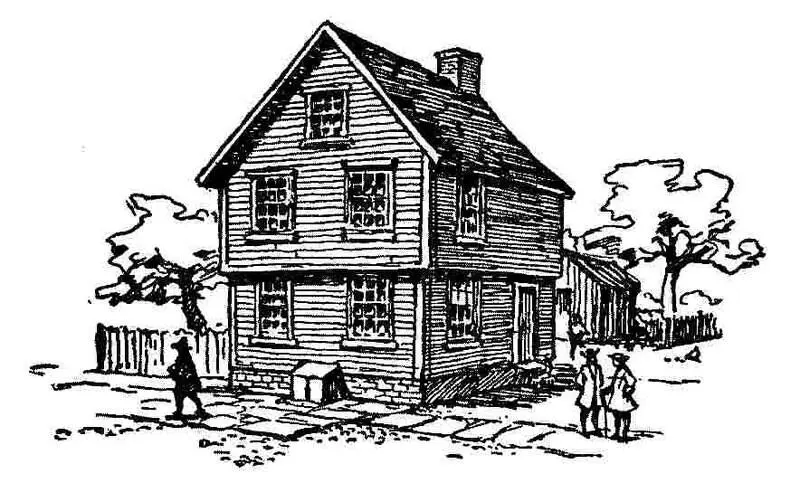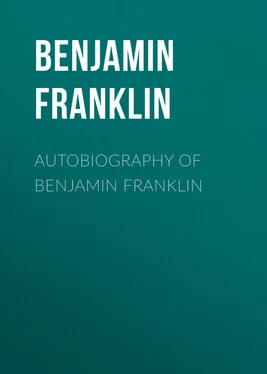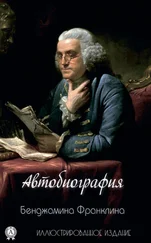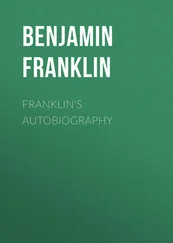Бенджамин Франклин - Autobiography of Benjamin Franklin
Здесь есть возможность читать онлайн «Бенджамин Франклин - Autobiography of Benjamin Franklin» — ознакомительный отрывок электронной книги совершенно бесплатно, а после прочтения отрывка купить полную версию. В некоторых случаях можно слушать аудио, скачать через торрент в формате fb2 и присутствует краткое содержание. Жанр: foreign_prose, foreign_antique, на английском языке. Описание произведения, (предисловие) а так же отзывы посетителей доступны на портале библиотеки ЛибКат.
- Название:Autobiography of Benjamin Franklin
- Автор:
- Жанр:
- Год:неизвестен
- ISBN:нет данных
- Рейтинг книги:4 / 5. Голосов: 1
-
Избранное:Добавить в избранное
- Отзывы:
-
Ваша оценка:
- 80
- 1
- 2
- 3
- 4
- 5
Autobiography of Benjamin Franklin: краткое содержание, описание и аннотация
Предлагаем к чтению аннотацию, описание, краткое содержание или предисловие (зависит от того, что написал сам автор книги «Autobiography of Benjamin Franklin»). Если вы не нашли необходимую информацию о книге — напишите в комментариях, мы постараемся отыскать её.
Autobiography of Benjamin Franklin — читать онлайн ознакомительный отрывок
Ниже представлен текст книги, разбитый по страницам. Система сохранения места последней прочитанной страницы, позволяет с удобством читать онлайн бесплатно книгу «Autobiography of Benjamin Franklin», без необходимости каждый раз заново искать на чём Вы остановились. Поставьте закладку, и сможете в любой момент перейти на страницу, на которой закончили чтение.
Интервал:
Закладка:
John was bred a dyer, I believe of woollens, Benjamin was bred a silk dyer, serving an apprenticeship at London. He was an ingenious man. I remember him well, for when I was a boy he came over to my father in Boston, and lived in the house with us some years. He lived to a great age. His grandson, Samuel Franklin, now lives in Boston. He left behind him two quarto volumes, MS., of his own poetry, consisting of little occasional pieces addressed to his friends and relations, of which the following, sent to me, is a specimen. 8 8 The specimen is not in the manuscript of the Autobiography .
He had formed a short-hand of his own, which he taught me, but, never practising it, I have now forgot it. I was named after this uncle, there being a particular affection between him and my father. He was very pious, a great attender of sermons of the best preachers, which he took down in his short-hand, and had with him many volumes of them. He was also much of a politician; too much, perhaps, for his station. There fell lately into my hands, in London, a collection he had made of all the principal pamphlets relating to public affairs, from 1641 to 1717; many of the volumes are wanting as appears by the numbering, but there still remain eight volumes in folio, and twenty-four in quarto and in octavo. A dealer in old books met with them, and knowing me by my sometimes buying of him, he brought them to me. It seems my uncle must have left them here when he went to America, which was about fifty years since. There are many of his notes in the margins.
This obscure family of ours was early in the Reformation, and continued Protestants through the reign of Queen Mary, when they were sometimes in danger of trouble on account of their zeal against popery. They had got an English Bible, and to conceal and secure it, it was fastened open with tapes under and within the cover of a joint-stool. When my great-great-grandfather read it to his family, he turned up the joint-stool upon his knees, turning over the leaves then under the tapes. One of the children stood at the door to give notice if he saw the apparitor coming, who was an officer of the spiritual court. In that case the stool was turned down again upon its feet, when the Bible remained concealed under it as before. This anecdote I had from my uncle Benjamin. The family continued all of the Church of England till about the end of Charles the Second's reign, when some of the ministers that had been outed for non-conformity, holding conventicles 9 9 Secret gatherings of dissenters from the established Church.
in Northamptonshire, Benjamin and Josiah adhered to them, and so continued all their lives: the rest of the family remained with the Episcopal Church.

Birthplace of Franklin. Milk Street, Boston.
Josiah, my father, married young, and carried his wife with three children into New England, about 1682. The conventicles having been forbidden by law, and frequently disturbed, induced some considerable men of his acquaintance to remove to that country, and he was prevailed with to accompany them thither, where they expected to enjoy their mode of religion with freedom. By the same wife he had four children more born there, and by a second wife ten more, in all seventeen; of which I remember thirteen sitting at one time at his table, who all grew up to be men and women, and married; I was the youngest son, and the youngest child but two, and was born in Boston, New England. 10 10 Franklin was born on Sunday, January 6, old style, 1706, in a house on Milk Street, opposite the Old South Meeting House, where he was baptized on the day of his birth, during a snowstorm. The house where he was born was burned in 1810.—Griffin.
My mother, the second wife, was Abiah Folger, daughter of Peter Folger, one of the first settlers of New England, of whom honorable mention is made by Cotton Mather, 11 11 Cotton Mather (1663-1728), clergyman, author, and scholar. Pastor of the North Church, Boston. He took an active part in the persecution of witchcraft.
in his church history of that country, entitled Magnalia Christi Americana , as " a godly, learned Englishman ," if I remember the words rightly. I have heard that he wrote sundry small occasional pieces, but only one of them was printed, which I saw now many years since. It was written in 1675, in the home-spun verse of that time and people, and addressed to those then concerned in the government there. It was in favour of liberty of conscience, and in behalf of the Baptists, Quakers, and other sectaries that had been under persecution, ascribing the Indian wars, and other distresses that had befallen the country, to that persecution, as so many judgments of God to punish so heinous an offense, and exhorting a repeal of those uncharitable laws. The whole appeared to me as written with a good deal of decent plainness and manly freedom. The six concluding lines I remember, though I have forgotten the two first of the stanza; but the purport of them was, that his censures proceeded from good-will, and, therefore, he would be known to be the author.
"Because to be a libeller (says he)
I hate it with my heart;
From Sherburne town, 12 12 Nantucket.
where now I dwell
My name I do put here;
Without offense your real friend,
It is Peter Folgier."
My elder brothers were all put apprentices to different trades. I was put to the grammar-school at eight years of age, my father intending to devote me, as the tithe 13 13 Tenth.
of his sons, to the service of the Church. My early readiness in learning to read (which must have been very early, as I do not remember when I could not read), and the opinion of all his friends, that I should certainly make a good scholar, encouraged him in this purpose of his. My uncle Benjamin, too, approved of it, and proposed to give me all his short-hand volumes of sermons, I suppose as a stock to set up with, if I would learn his character. 14 14 System of short-hand.
I continued, however, at the grammar-school not quite one year, though in that time I had risen gradually from the middle of the class of that year to be the head of it, and farther was removed into the next class above it, in order to go with that into the third at the end of the year. But my father, in the meantime, from a view of the expense of a college education, which having so large a family he could not well afford, and the mean living many so educated were afterwards able to obtain—reasons that he gave to his friends in my hearing—altered his first intention, took me from the grammar-school, and sent me to a school for writing and arithmetic, kept by a then famous man, Mr. George Brownell, very successful in his profession generally, and that by mild, encouraging methods. Under him I acquired fair writing pretty soon, but I failed in the arithmetic, and made no progress in it. At ten years old I was taken home to assist my father in his business, which was that of a tallow-chandler and sope-boiler; a business he was not bred to, but had assumed on his arrival in New England, and on finding his dyeing trade would not maintain his family, being in little request. Accordingly, I was employed in cutting wick for the candles, filling the dipping mould and the moulds for cast candles, attending the shop, going of errands, etc.
I disliked the trade, and had a strong inclination for the sea, but my father declared against it; however, living near the water, I was much in and about it, learnt early to swim well, and to manage boats; and when in a boat or canoe with other boys, I was commonly allowed to govern, especially in any case of difficulty; and upon other occasions I was generally a leader among the boys, and sometimes led them into scrapes, of which I will mention one instance, as it shows an early projecting public spirit, tho' not then justly conducted.
Читать дальшеИнтервал:
Закладка:
Похожие книги на «Autobiography of Benjamin Franklin»
Представляем Вашему вниманию похожие книги на «Autobiography of Benjamin Franklin» списком для выбора. Мы отобрали схожую по названию и смыслу литературу в надежде предоставить читателям больше вариантов отыскать новые, интересные, ещё непрочитанные произведения.
Обсуждение, отзывы о книге «Autobiography of Benjamin Franklin» и просто собственные мнения читателей. Оставьте ваши комментарии, напишите, что Вы думаете о произведении, его смысле или главных героях. Укажите что конкретно понравилось, а что нет, и почему Вы так считаете.










![Benjamin Franklin - Memoirs of Benjamin Franklin; Written by Himself. [Vol. 2 of 2]](/books/747975/benjamin-franklin-memoirs-of-benjamin-franklin-wr-thumb.webp)
![Benjamin Franklin - Memoirs of Benjamin Franklin; Written by Himself. [Vol. 1 of 2]](/books/748053/benjamin-franklin-memoirs-of-benjamin-franklin-wr-thumb.webp)